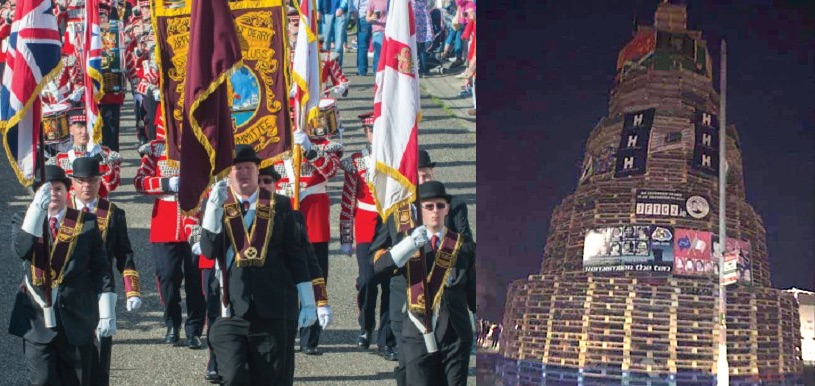
Loyalist parades and bonfires have continued across the Six Counties ahead of the ‘Last Saturday’ parades by the Royal Black Preceptory, the senior organisation associated to the anti-Catholic Orange Order.
On Saturday, August 28, the organisation also known as ‘the Imperial Grand Black Chapter Of The British Commonwealth’ is to hold 28 local parades across the north, effectively drawing the marching season to a close.
The local parades will replace the larger events of years pst, due to Covid-19.
‘Sovereign Grand Master’ Rev William Anderson, said he wanted the parades to bear “witness for the Reformed Christian Faith and celebrate the centenary of our beloved country”.
Saturday August 14 saw over 50 parades by the Apprentice Boys, with the largest in Derry, usually one of the biggest marches of the Protestant marching season. Thousands of unionists normally attend to mark a Protestant battle victory dating from August 1689, but this year little more than a thousand took part in Derry due to Covid-19.
Despite the lower turnout, it again took place in tandem with loyalist bonfires draped in anti-nationalist sectarian symbolism. One such pyre in Irish Street in the Waterside (pictured) saw a ritualistic burning of 1981 hunger strike commemorative posters and banners, an image of the Craigavon 2 from their miscarriage of justice campaign, and various Irish and Scottish flags.
Despite being loaded with sectarian symbolism, the ‘Siege of Derry’ bonfires failed to draw any criticism from the media or political establishment.
However, one nationalist bonfire in Derry the following night, which saw banners and symbols directed at the Crown Forces and unionism generally, was heavily condemned.
As a response to the loyalist provocations, the traditional August 15 bonfire was ‘dressed’ with threatening references to members of the Crown Forces and PSNI Chief Simon Byrne, as well as unionist and loyalist symbols and flags.
It drew condemnation from across the political spectrum, including strong condemnation from Sinn Féin and the nationalist and republican community generally.
Those involved removed some of the banners following the criticism, although many present condemned the attitude of unionist politicians as hypocritical.
Despite remaining silent on hundreds of provocative loyalist bonfires thoughout the summer, DUP leader Jeffrey Donaldson described the one nationalist version as a “hate crime”.
Sinn Féin Assembly member Karen Mullan said the display had “no place in our society and are not representative of the local community”.
“This was in stark contrast to the many excellent community events held throughout the area organised by the Gasyard Féile and supported by community organisations which were widely supported,” she said.
“It is time these illegal bonfires which promote hatred come to an end once and for all.”
![[Irish Republican News]](https://republican-news.org/graphics/title_gifs/rn.gif)
![[Irish Republican News]](https://republican-news.org/graphics/title_gifs/harp.gif)

